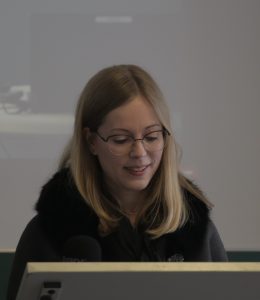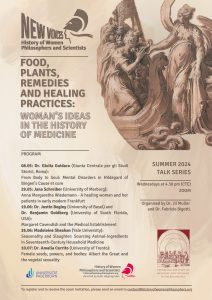 Dr. Jil Muller‘s current research is focusing on the history of medicine with a particular emphasis on the early modern period and from a female perspective. In 2023, she had organised the International Conference on Women and their Body, the proceedings of which will be published in the coming months. And now she is organising the New Voices Talk Series Food, Plants, Remedies and Healing Practices: Women’s Ideas in the History of Medicine.
Dr. Jil Muller‘s current research is focusing on the history of medicine with a particular emphasis on the early modern period and from a female perspective. In 2023, she had organised the International Conference on Women and their Body, the proceedings of which will be published in the coming months. And now she is organising the New Voices Talk Series Food, Plants, Remedies and Healing Practices: Women’s Ideas in the History of Medicine.
When queried about the title of the book Women and their Body, Jil Muller replied: “it is important to acknowledge that women, despite their diversity, share a common experience of their bodies not being accepted in the same way as male bodies. The use of the singular ‘body’ does not imply that all women’s bodies are the same; rather, it emphasises the shared problems and challenges that women face. Furthermore, the use of this singular form conveys objectivity by indicating that we are not discussing the body of a specific person or group, and we are not excluding transgender or disabled individuals. Instead, we are referring to the diversity of all female bodies. Additionally, our focus is not solely on the politics of women’s rights or their struggle for control over their own bodies. We aim to create a new awareness of the female body, a new ‘body politics’, by specifically analysing the body as an object (De Clercq 2013, 1).”
In the Introduction of the book, she wants to emphasize three key points that she finds personally intriguing. These points shed light on the significant transformations that have taken place throughout history, while also highlighting the need for further changes to empower women and grant them autonomy over their own bodies. The first central point analyses the lack of knowledge about the female body and therefore concerns the more medical point of view. The second point deals with an idea in feminist ethics: the supposed weakness of the female body, and finally the third point underlines the social pressure and feelings of shame and guilt that women still feel today.

Should you now be interested, you are advised to await the publication of the book by De Gruyter.
Alternatively, you may wish to attend the New Voices Talk Series, commencing on 8 May at 4.30pm.
The objective of the New Voices Talk Series, as conceived by Dr. Jil Muller, was to draw attention to the pivotal roles played by women in the history of medicine. These women have often been the primary healers, caregivers, midwives, and guardians of traditional knowledge surrounding food, plants, remedies, and healing practices. Historically, it has been the woman who has assumed the responsibility of caring for and providing for the sick, particularly within the domestic setting. Since the 16th and 17th centuries, this tradition has been increasingly recorded in writing, which today provides invaluable insight into the household and the life of women, as well as their medical knowledge and the various illnesses and cures. However, women’s writings are often overlooked or marginalised in mainstream narratives due to two factors: firstly, they did not write in the scientific language of Latin, and secondly, their writings were not in the conventional form of a published book. Their knowledge is dispersed throughout a multitude of sources, including recipe or receipt books, letters, diaries, and even prose or drama. This makes it challenging to conduct research on these contributions. Additionally, these contributions are frequently not acknowledged as traditional knowledge, despite their frequent reliance on traditional knowledge and knowledge transfer.
Those with an interest in this subject may also be interested in the call for papers on the same topic. See here for the Call for papers.
You cannot copy content of this page








